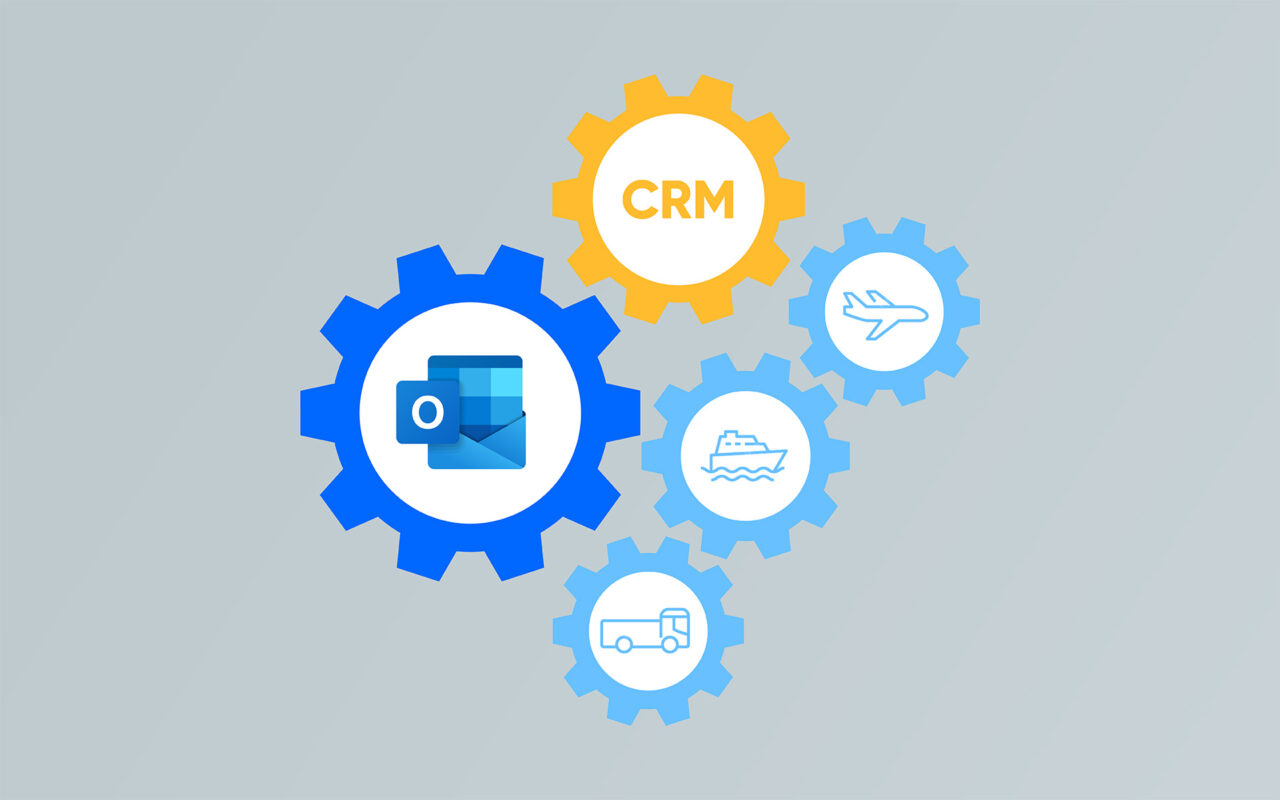The transportation and logistics industry stands as the backbone of global trade, ensuring goods flow seamlessly from manufacturers to consumers. As the cogs that keep trade moving, companies in this sector juggle complex workflows — from procurement to distribution — often across international borders.

But like many industries in the modern age, transportation and logistics have been transformed by technology, with CRM software emerging as a pivotal tool. The right distribution CRM software not only streamlines operations but addresses the unique challenges this industry faces.
The functionality of a CRM can also be greatly enhanced when integrated with Outlook, as in the example of eWay-CRM. For the transportation and logistics industry, there are many reasons why this collaboration can solve many of the common challenges it faces.
The Unique Workflows of the Transportation and Logistics Industry
The Complexity of Distribution and Transportation
Transportation and logistics is no ordinary industry. It is a massive network that connects suppliers, manufacturers, retailers, and end consumers. At the heart of this network lies distribution, which requires precise coordination of various moving parts to ensure timely and efficient delivery.
Challenges in Coordinating Multimodal Transport
Multimodal transport, which involves the use of more than one mode of transportation (like ships, trucks, and planes), further amplifies the intricacy. Each mode has its own schedule, constraints, and requirements, making the orchestration of a seamless transition between them a formidable task.
Information Flow is as Critical as Goods Flow
In logistics, the continuous flow of accurate information is as critical as the physical movement of goods. Companies need to keep all stakeholders updated with real-time data, from shipment status to inventory levels, to prevent costly disruptions.
Navigating Regulatory and Compliance Hurdles
The cross-border nature of many transportation tasks introduces regulatory complexities. Each country has its own set of rules, documentation requirements, and compliance standards that logistics providers must adhere to, adding another layer of challenge to the already intricate workflow.
By understanding these unique workflows and challenges, we can better appreciate the pivotal role CRM software plays in providing solutions tailored to the transportation and logistics sector.
Common Challenges Faced by Transportation and Logistics Companies
Communication is the linchpin in logistics. Yet, many companies grapple with inefficient communication systems, leading to missed deliveries, inaccurate data, and unsatisfied customers. Not only that, this industry faces more common challenges:
Lack of Real-Time Visibility
In the age of instant gratification, customers demand real-time updates on their shipments. Companies that fail to offer real-time tracking risk falling behind their competitors and facing customer churn.
Scalability Concerns
As businesses grow, so does the complexity of their operations. Many transportation companies struggle to scale their processes and systems effectively to meet increasing demands.
Compliance and Regulatory Issues
As mentioned, the logistics industry is heavily regulated. Keeping up with ever-changing regulations across different regions and countries can be daunting, and non-compliance can result in hefty penalties.
Fragmented Customer Data
Understanding customer preferences, history, and needs is crucial. However, many companies work with fragmented or siloed customer data, leading to missed opportunities and ineffective customer interactions.
Integrating with Other Business Systems
The logistics industry relies on a multitude of systems from inventory management to billing. If these systems don't communicate seamlessly, inefficiencies and errors can arise.
Identifying these challenges is the first step. The next logical progression is to explore how CRM software, especially those designed for transportation companies, can address these issues.
How Distribution CRM Software Elevates the Industry
A robust CRM consolidates all communication channels. Whether it's emails, calls, or even social media interactions, everything is stored in a singular platform, ensuring that every team member stays updated. In addition, it offers:
Real-time Data Access and Reporting
Modern CRM software offers real-time data access. This means companies can now provide customers with instant updates on shipments. This ultimately reduces inquiries and enhances customer trust.
Seamless Scalability
The best CRM systems for the logistics industry are scalable. They can adapt to the growing needs of a business, ensuring that expanding operations don't lead to operational inefficiencies.
Unified Customer Database
By centralizing customer data, CRM software ensures that businesses can derive actionable insights about their clients. Tailored services, personalized interactions, and effective problem resolution become the norm, not the exception. In fact, 47% of CRM users have given credit to CRM technology for a considerable impact on their customer satisfaction rate.
Integration Capabilities
The power of a CRM system lies in its ability to integrate with other business tools. From inventory systems to billing software, a good CRM will ensure seamless communication across platforms, making operations smoother and reducing room for error.
What to Look for in CRM Software for Transportation Companies
A CRM's efficiency isn't just about its features but also its usability. Choose software that offers a straightforward, intuitive interface to ensure that your team can adopt it without a steep learning curve. Not only that, a good CRM should offer:
Customization Options
Every logistics company operates differently. Your CRM should offer customization options to tailor it according to your specific workflow and needs.
Cloud-Based Solutions
Cloud-based CRM solutions ensure that your data is accessible anytime, anywhere. This is crucial for logistics and transportation companies that operate across different time zones and locations.
Mobile Access
The transportation industry is always on the move. A good CRM will offer mobile accessibility, ensuring that your team has access to critical information, even when they're out in the field.
Advanced Analytics
The ability to analyze and interpret data can be the difference between growth and stagnation. Ensure that the CRM you choose offers robust analytics tools, like Power BI, to gain insights into customer behavior, sales, and more.
Efficient Customer Support
Even the best systems can face hiccups. It's essential to choose a CRM provider that offers prompt and efficient customer support to address any issues or queries.
Data Security
Given the sensitive nature of the data handled by transportation companies, security is paramount. Ensure that your CRM employs stringent security measures, including encryption, to protect your data.
Why eWay-CRM is the Optimal Choice
Integration with Outlook
eWay-CRM operates seamlessly within the Microsoft Outlook dashboard, an environment that many professionals use daily. This integration ensures that every email, important communication, or detail can be directly saved to the CRM without switching platforms. The ease of integration significantly reduces the learning curve, enabling teams to hit the ground running.
Comprehensive Modules for Every Need
Besides the expected CRM functionalities, eWay-CRM boasts a sales module, project management capabilities, and even email marketing tools. This makes it a one-stop solution for transportation and logistics businesses that require an all-encompassing platform to manage their multifaceted operations.
Tailored for the Industry
Understanding the nuances of the transportation and logistics sectors, eWay-CRM offers CRM software that can be customized to tackle industry-specific challenges. Its range of features ensures that businesses get a solution aligned with their exact needs, making operations smoother and more efficient.
On-The-Go Accessibility
Never miss a beat with eWay-CRM's mobile and cloud application. Whether you're tracking shipments, accessing crucial client details, or responding to urgent communications, this CRM ensures professionals remain connected, informed, and proactive, even while on the move.
Scalable for Business Growth
eWay-CRM provides a scalable solution that grows with your business. Start for free and enjoy the flexibility to upgrade only when you're ready. As demands evolve and the need for advanced features arises, eWay-CRM's adaptable platform ensures that businesses can seamlessly integrate new functionalities, always staying ahead of the curve.
Dedicated Support and Continuous Updates
Behind the scenes, eWay-CRM's dedicated team works tirelessly to offer users an impeccable experience. From providing top-notch customer support to rolling out regular software updates, the commitment is clear: ensuring businesses have the latest tools and the support they need to maximize their CRM investment.
Picking the Right CRM for Transportation and Logistics
In the digital age, relying solely on traditional methods of operations can hinder the growth of transportation companies. Embracing distribution CRM software not only streamlines workflows but also introduces an element of proactive management, ensuring businesses remain competitive.
It's essential that the chosen CRM software aligns perfectly with the company's overarching objectives. From managing distribution networks efficiently to handling customer interactions effectively, the right CRM can be a game-changer.
While there are numerous CRM options available, eWay-CRM stands out due to its intuitive interface, industry-friendly features, and commitment to customer success. Its emphasis on user-friendliness ensures that teams can transition without a steep learning curve.
Companies should take the time to evaluate their options, consider their specific needs, and opt for CRM software that promises not just to solve present challenges but also to adapt to future demands.
And as we've explored, for those in the transportation and logistics realm, eWay-CRM offers a compelling, comprehensive solution.
A CRM is not only a vital tool for customer engagement, but also for boosting business performance. Explore this in How Can a CRM Help Boost Your Business Performance?











